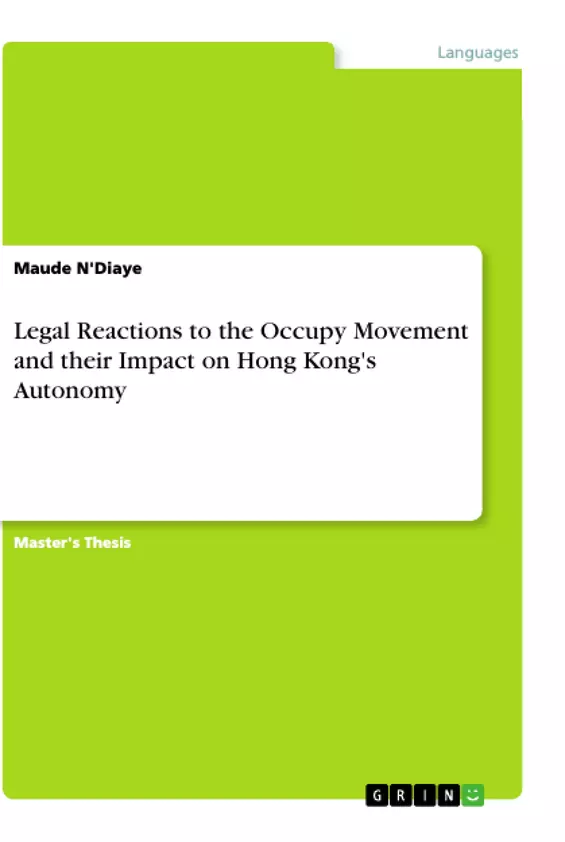In this master thesis, we will present the different legal responses that have been made in reaction to the Occupy movement in the form of lawsuits, Basic Law Interpretation, and new legislation. These reactions to the Occupy movement are an opportunity for us to measure the degree of autonomy that the PRC is ready to give to the HKSAR and its level of involvement in certain issues. Similarly, such a sensitive matter concerning Chinese sovereignty as well as the politics of democracy make it a very lively and up-to-date debate.
First, we will present Hong Kong's history before and after the handover. Second, we will lay out its autonomous status as a Special Administrative Region of the PCR, the foundation principle of the “One country, two systems" and the differences between Mainland and Hong Kong legal systems. Third, the Occupy movement, its background, and purpose will be explained. Fourth, the legal reactions to the Occupy movement will be listed and analyzed and finally, they will be put into legal perspective in order to find out if these reactions actually represent a threat to the HKSAR’s autonomy.
The objective of this paper is to determinate if the legal interference of the PRC has an effective influence on the autonomy of the HKSAR and if so, how this influence is visible through legal reactions over the Occupy movement.
Inhaltsverzeichnis (Table of Contents)
- Introduction
- I. A Brief History of Hong Kong
- Hong Kong as a British colony
- Hong Kong after 1997
- II. Hong Kong Autonomy as HKSAR
- Different definitions of autonomy
- The Sino-British Joint Declaration and the Basic Law
- "One Country, Two Systems"
- The Common Law legal system
- China's socialist civil law system
- A complex fusion
- III. The Occupy Central Movement
- Origins and social context
- Methods and Objectives
- Resolution and results
- IV. The Legal Reactions to the Occupy Movement
- The case for unlawful assembly
- Context and charges
- Trial and sentence
- Legal consequences of the case
- The oath-taking case
- Context and charges
- Trial and sentence
- The NPCSC's Interpretation and its legal consequences
- New laws and legislation projects
- Article 23
- Modification of the Legislative Council's House Ruling
- National anthem and Joint checkpoint
- The case for unlawful assembly
- V. The Impact on Hong Kong's Autonomy
- The Rule of Law, “One Country, Two Systems” and the independence of the judiciary
- The impact on the Rule of Law
- “One Country, Two Systems” and the case for oath-taking
- The impact on Hong Kong's independent judiciary and legislative
- The legal reactions to the Occupy Central movement and their impact on Hong Kong's autonomy
- The Rule of Law, “One Country, Two Systems” and the independence of the judiciary
Zielsetzung und Themenschwerpunkte (Objectives and Key Themes)
This thesis examines the legal reactions to the Occupy Central Movement in Hong Kong and their impact on the city's autonomy. It analyzes the historical background of Hong Kong, its transition to a Special Administrative Region under "One Country, Two Systems", and the legal framework that governs the city's autonomy. The work then investigates the Occupy Central Movement, its origins, methods, and objectives. Finally, it explores the legal consequences of the movement, specifically focusing on the case for unlawful assembly, the oath-taking case, and new laws and legislation projects implemented by the Chinese government.
- The impact of the Occupy Central Movement on Hong Kong's autonomy
- The role of law in shaping Hong Kong's political landscape
- The relationship between the Chinese government and Hong Kong's legal system
- The tension between the principles of "One Country, Two Systems" and the maintenance of Hong Kong's autonomy
- The evolution of Hong Kong's legal system and its implications for the future
Zusammenfassung der Kapitel (Chapter Summaries)
The first chapter provides a brief history of Hong Kong, tracing its development from a British colony to a Special Administrative Region of China. The second chapter explores the concept of Hong Kong autonomy, analyzing different definitions and the legal framework governing its status under "One Country, Two Systems". The third chapter delves into the Occupy Central Movement, examining its origins, methods, and objectives. The fourth chapter focuses on the legal reactions to the movement, including the case for unlawful assembly, the oath-taking case, and new laws and legislation projects implemented by the Chinese government.
Schlüsselwörter (Keywords)
Hong Kong, Occupy Central Movement, Umbrella Revolution, autonomy, "One Country, Two Systems", Sino-British Joint Declaration, Basic Law, legal system, Rule of Law, unlawful assembly, oath-taking case, Article 23, Chinese government, Hong Kong Special Administrative Region (HKSAR), legal consequences, impact on Hong Kong's autonomy.
Frequently Asked Questions
What was the Occupy Central Movement in Hong Kong?
Also known as the Umbrella Revolution, it was a social movement advocating for democratic reforms and universal suffrage in the selection of Hong Kong's Chief Executive.
What does "One Country, Two Systems" mean?
It is a constitutional principle that allows Hong Kong to maintain its own legal and economic system (Common Law) while being part of the People's Republic of China.
How did the PRC respond legally to the Occupy movement?
Responses included lawsuits for unlawful assembly, interpretations of the Basic Law by the NPCSC (e.g., the oath-taking case), and the proposal of new security legislation.
Is Hong Kong's judicial independence under threat?
The thesis analyzes whether legal interferences and the interpretation of the Basic Law by Beijing represent a significant threat to the autonomy and the Rule of Law in Hong Kong.
What is Article 23 of the Basic Law?
It is a provision requiring Hong Kong to enact its own national security laws, a subject of intense political debate regarding its impact on civil liberties.
- Quote paper
- Maude N'Diaye (Author), 2018, Legal Reactions to the Occupy Movement and their Impact on Hong Kong's Autonomy, Munich, GRIN Verlag, https://www.grin.com/document/511859



